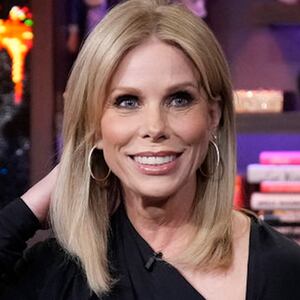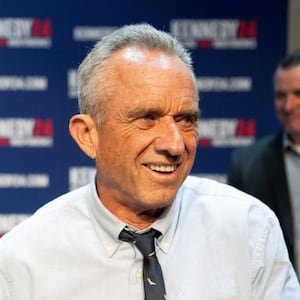At a Washington, D.C., rally in January 2022, the anti-vaccine activist Robert F. Kennedy Jr. drew an interesting comparison between COVID-19 vaccine mandates and the Third Reich. “Even in Hitler’s Germany, you could cross the Alps to Switzerland,” he said at the time. “You could hide in an attic like Anne Frank did.”
It didn’t go well for him. Kennedy’s comments earned condemnation from the Auschwitz Museum and his own wife, actress Cheryl Hines, who described his invocation of the Holocaust as “reprehensible and insensitive.” (As Vice reported, this was far from the first time he likened vaccines to the systematic murder of six million Jews.)
Among those unbothered by the comparison, however, was his old friend Mike Binder. “Time will prove him right,” the comedian and filmmaker wrote on Twitter, calling for his fellow comics to spread Kennedy’s message. “[U]se your platforms. It’s not too late. Have Bobby on your shows ASAP. Read his book. Read that speech. And pls@pass [sic] this on.”
Two years later, Kennedy is running for president and Binder’s peers have risen to the challenge. Starting with a controversial interview on The Joe Rogan Experience last June in which Kennedy falsely argued that vaccines cause autism, the candidate has wholeheartedly embraced the power of comedy podcasts to reach young, disaffected voters. As Media Matters reported in February, he sees them as a vital part of his strategy.
“This year is going to be the political campaign that will be decided on by podcasts,” he told Jordan Peterson last year. “I think the podcasts have the capacity this election for reaching people, and allowing, you know, sort of dissident and insurgent candidates like myself to end-run the corporate media monolith.”
The man knows his audience. In keeping with his misinformation-laden appearance on Rogan’s show, Kennedy’s “end-run” of mainstream media has largely hewed to a corner of the comedy world where deadly conspiracy theories are just another form of free speech. His strategy reflects his own willingness to align with right-wing media figures (and their audiences), and perhaps more importantly, the increasing purchase of right-wing ideology in the comedy industry. From Rogan to Bill Maher, Kennedy’s hosts have been a who’s-who of comedy’s biggest cranks. It just so happens that some of them are also incredibly popular artists with highly engaged fanbases.
There’s Andrew Schulz, who in his 2020 Netflix special blamed the pandemic on dirty Chinese people and in 2021 persuaded a Los Angeles theater to waive its vaccine requirement for his shows. There’s Tim Dillon, the former subprime mortgage broker and current 9/11 truther who has lately embraced the white nationalist “Great Replacement” conspiracy theory, hosted Alex Jones, praised the white nationalist writer Steve Sailer, stoked the moral panic over trans people, and questioned the efficacy of COVID vaccines and masks. (He was also banned from Airbnb in 2021 for threatening to burn down his hosts’ home over a cleaning fee, but that’s neither here nor there.)
There’s Dave Smith, the anti-vaccine Libertarian Party activist who has also embraced the Great Replacement theory, praised Nazis, demonized trans people, argued that drunk sex can’t be rape, and said that American Jews should be “grateful” to the United States for allowing them to flourish.
There’s Theo Von, who recently sat down for amiable chats with Tucker Carlson (featuring misinformation about the polio vaccine) and a former Border Patrol chief (featuring violent anti-immigrant rhetoric). Kennedy has even found a friendly ear in Whitney Cummings, the 2 Broke Girls creator who has spent recent years arguing that comedians are supposed to be scumbags—and who lived up to her promise by mocking trans women in her latest stand-up special.
In some of these conversations, Kennedy savvily frames his reputation as an anti-vaxxer in terms that comedians are sure to appreciate: as a form of cancel culture.
“That was the label that was put on me to censor me, to silence me, to discredit me,” he told Tiger Belly’s Bobby Lee, a comedian who spent the last decade claiming to have raped a crying child prostitute in Tijuana, then last year said it was actually all a joke. “Vaccines, like other medicine, if they work, I’m for ’em," Kennedy added. “But let’s make sure they're properly tested, both for safety and for efficacy. Let’s make sure that we know that that product is not causing more problems than it’s averting.”
In Kennedy’s conversation with Tim Dillon, who in 2022 interviewed the alleged rapist and human trafficker Andrew Tate in Romania, he described the anti-vax label as a “pejorative” intended to “marginalize” and “silence” him.
Despite his efforts to distance himself from his reputation, Kennedy hasn’t exactly shied away from spouting anti-vaccine misinformation. In that same conversation with Dillon, he argued that a litany of chronic diseases “became ubiquitous around 1989” when “the vaccine schedule exploded”—a claim he also made on comedian Adam Carolla’s podcast—and asked why the NIH isn’t funding research into “what is causing the autism epidemic.” (“We might be over-vaccinating people,” Dillon agreed.)
On Von’s This Past Weekend podcast, he agreed with the host’s false claim that the polio vaccine “ended up giving cancer to a lot of women.” On Howie Mandel’s podcast, he insisted he’s not anti-vaccine before acknowledging that he never got the COVID-19 vaccine and falsely claiming (again) that vaccines cause autism. “I’m not saying all autism is caused by vaccines,” he told Mandel. “I’m saying that the vaccines definitely, you know, are largely responsible for the epidemic that we saw begin in 1989.” He made this same argument to Bill Maher, who agreed that his position is “not unreasonable.”
Some comedians have been content not to discuss Kennedy’s anti-vaccine stance at all, whether because they’re unconcerned with it or because they agree. Dave Smith hosted Kennedy on his Part of the Problem podcast to debate his position on Israel. (“You’re so great on Ukraine and you’re so great on the vaccine, why can’t you be great on this too?”)
Andrew Schulz and Akaash Singh, the hosts of Flagrant, mostly prodded him about corporate influence in American politics, conspiracy theories about the assassinations of his father and uncle, and Kennedy’s relationship with Jeffrey Epstein, which Kennedy has explained by pointing out that he actually associated with lots of sexual abusers. (That said, at one point, he did claim that the CDC’s Advisory Committee on Immunization Practices profits from making people sick.)
Theo Von mostly stuck to questions about his other campaign positions, while Bobby Lee mostly asked about his relationship with Cheryl Hines, who also appeared on the episode. Cummings only touched the vaccine issue in a rambling pre-interview speech that concluded with the message, “Let’s be honest with ourselves, no one knows anything.”
Cummings’ monologue reflected a popular anti-intellectual strain in contemporary comedy, an art form full of professional talkers who believe they shouldn’t be held responsible for anything they say or do. (“There’s too many variables to know,” she said a minute later. “Don’t blame me.”)
It’s only natural that the stigma against spreading anti-vaccine misinformation would register as woke dogma, especially in the wake of a pandemic that had a radicalizing effect on many comedy professionals. Asked perhaps for the first time in their careers to consider a greater good, they ended up negatively polarized against the basic idea of public health. As the Los Angeles Times reported last month, a comedy benefit for Kennedy’s campaign featured jokes about “lockdown masking, Biden’s age, the pathetic Democrats—and more masking.”
Given the reality of Kennedy’s electoral prospects, it may be tempting to laugh off his podcast blitz as a shameful but ultimately trivial development. Unfortunately, the opposite is true. If we understand his campaign not as a serious bid for the White House but as a means of spreading his particular set of beliefs, it becomes clear that his strategy is already a wild success. The danger is not that comedians might deliver him the power to prosecute medical journals, as he’s promised in a campaign ad, but that their fans might hear what he has to say and believe it.
As the writer Hamilton Nolan argued last year, the moral calculus here is very simple: The more people reject vaccines, the more people die. Sooner or later, the comedians who lent Kennedy their platforms will have blood on their hands—if they don’t already.








